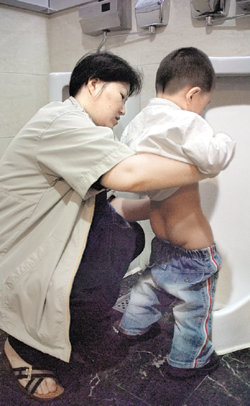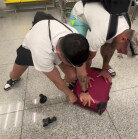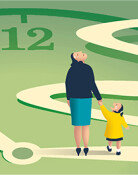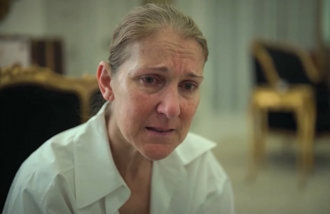Taming Bed-Wetting

Drink water in the daytime. If you want to calculate your childs average cystic capacity, add two to their age and then multiply that by 30 cc. For example, an eight-year-old childs capacity is approximately 300cc. If your child suffers from bed-wetting, however, he or she cannot hold even 100ccs in his or her bladder. The answer is to drink a lot in the daytime and refrain from liquid at night.
Professor Moon says, After school, on average, kids have at least one extra-class per day or three per week and back home in the evening. That is why they do not drink water in the daytime but right before going to bed.
For children prone to bed-wetting, you should prepare water bottles for them to encourage drinking either after school or during extra-class for an efficient cure to the problem.
Additionally, a dinner that is either too early or too late may cause heavy water drinking at night. Some time between six and seven o clock in the evening is an ideal dinnertime. In general, children under 35kg drink 60mL after dinner, those from 35-45kg drink 90mL, and those above 45kg drink 120mL.
Alter their daily habits. If you punish them when they urinate in an improper way, children will become increasingly uneasy. Consequently, they may drink only a little water to reduce the number of times they must go to the bathroom. However, when they go to bed, they still make a mistake once they are relaxed.
It is imperative not to say things like, Your brothers and sisters are not making mistakes, what is wrong with you? The first thing you should do is to help them feel comfortable and remind them that many children have the same problem.
It is also important to make daily notes to monitor when your children wet their bed. By doing this, you can determine causes such as fatigue, heavy intake of water, or food at nighttime. It is important to note that cola, ice cream, and chocolate are the main culprits of urination and thirst.
In addition, parents should praise children when they show improvement in their bed-wetting, through gifts or eating out. However, if the child wets the bed again, the parent should help them acknowledge responsibility for their mistake by having them clean up their bed or help with laundry.
.
Recently, a couple of treatments have hit the market. Treatments include: an anti-urination hormone invented to reduce the amount of urine generated during night, an alarm that rings when a child wets the bed, and anti-choline to enlarge bladder size.
Park Kwan-hyun, a professor at Sungkyunkwan Medical School and doctor at Samsung Seoul Hospital, says, Different treatments work according to individual tastes. Thus, various methods of treatment are popular these days. For example, we use medicines like anti-urination hormone or anti-choline while adopting extra tools such as alarms.
If none of these treatments have an effect or cystic capacity is too low, physical treatments such as enlarging the bladder size are also available.
Lee Jin-han likeday@donga.com
Headline News
- Medical school quotas expanded after 27 years by 1,509
- ‘Pension replacement rate of 44-45% is negotiable,’ says Lee Jae-myung
- 16 out of 20 food companies see cost ratio decrease in 1st quarter
- Oksana Chusovitina with 8 Olympics under her belt gets injured
- Real income effectively reduced amid inflation hikes







